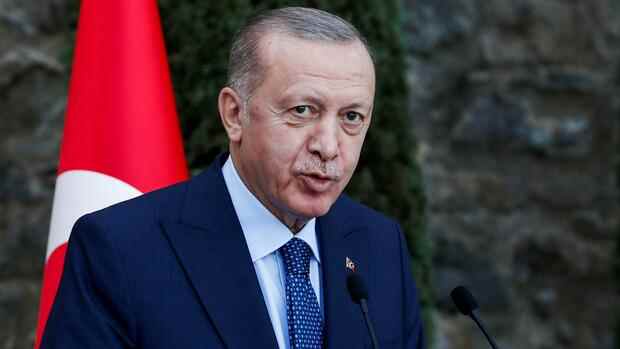Ankara In the midst of a severe currency crisis, Turkish President Recep Tayyip Erdogan exchanges finance ministers. According to the official gazette, the office is to be held by the deputy finance minister Nureddin Nebati. Finance Minister Lütfi Elvan has therefore submitted his resignation himself. He only held the post for about a year.
The Turkish lira reacted only minimally to the change of minister and was even slightly positive on Thursday morning (local time). The currency had previously gone uphill and downhill after controversial statements by Erdogan to interest rates and the intervention of the central bank. An interview with Erdogan’s state broadcaster TRT on Tuesday evening, in which he promised lower interest rates until the elections planned for 2023, caused additional pressure.
On this Wednesday, the Turkish central bank then intervened to support the lira on the foreign exchange market – but without too much success. Economists expect inflation in Turkey to accelerate to around 30 percent in the coming year. Much of this is attributed to currency devaluation.
The 59-year-old Elvan had spoken out against the recent cuts in the key interest rate from 19 to 15 percent, as reported by the Bloomberg news agency. Two days before the central bank cut interest rates for the third time in a row on November 18, Elvan called on “every institution to do its part within the scope of its own mandate” in order to curb the price increases.
Top jobs of the day
Find the best jobs now and
be notified by email.
A day later, Erdogan railed in parliament against “friends who still defend high borrowing costs”. A photo of Elvan, who didn’t join the applause for the president as he spoke, later spread across social media.
Nebati appears to have been surprised by the appointment
For many observers, this was a sign that Elvan’s star was sinking. “Elvan was on his way out when Erdogan made this speech a few weeks ago,” said financial analyst Timothy Ash. Even insiders in the AKP and in parliament had already expected after the budget negotiations in November that Elvan would not stay in office for long.
For his successor Nureddin Nebati this means the final ascent in his career. He rises from the vice minister to the executive chair in the treasury in Ankara. However, he seemed to have been surprised himself: Even after his appointment on Thursday morning, he still referred to himself as “Vice Minister” on his Twitter profile.
He only held the post of Minister of Finance of Turkey for about a year.
(Photo: imago images / Depo Photos)
The 57-year-old comes from Sanliurfa in the Kurdish southeast of the country. Before his political career, Nebati worked as a textile dealer for a long time and in the meantime ran a gas station. In 2014, the studied social scientist worked for a year as treasurer of the ruling party AKP and then sat for the party in the Turkish parliament for two legislative terms. In 2018 Erdogan’s son-in-law Berat Albayrak, at that time the government’s finance minister, appointed Nebati as his deputy.
In a first statement after his official appointment at 3:30 in the morning (local time), Nebati said on Twitter: “(…) May my Lord give me the ability to carry out the Ministry of Finance’s role that my President deems worthy and worthy is worthy of the trust he has placed in us. “
Interest opponents have the upper hand in the government
The most important factor in Nebati’s preference is his firm support for Erdogan’s interest rate policy. Nebati commented a few weeks ago: “High employment and high exports based on low interest rates and high production should be aimed for,” said Nebati, “instead of a macroeconomic approach based only on interest rates and exchange rates, on a current account deficit and low foreign debt . “That is exactly the anti-orthodox approach that Erdogan also supports in his economic policy.
Nebati also stated, “With the benefit of lower interest rates, we will channel the revenues we generate from the increase in exports into investments in energy, raw materials and intermediate goods, which are the largest items of our imports.” In this way, the government will reduce both reduce exchange rate pressures on inflation and increase employment. “Every time we have tried to implement our low interest rate policy since 2013, we have encountered strong resistance. This time we are determined to implement them. “
In addition, Nebati commented on the reasons for the recent inflationary crisis in Turkey – and, like Erdogan, blamed external forces for it. “We are experiencing a phase of manipulative currency attacks against this policy. In the struggle against it, I propose to all parties to re-evaluate the falsity of the policy dictated to us ‘high interest rates, low inflation’, especially for our country with a structural current account deficit. ”With Nebati’s appointment as minister, the interest rate enemies within the government should now be allowed finally gain the upper hand.
More: 60 percent loss since the beginning of the year: The background to the decline in the Turkish lira
